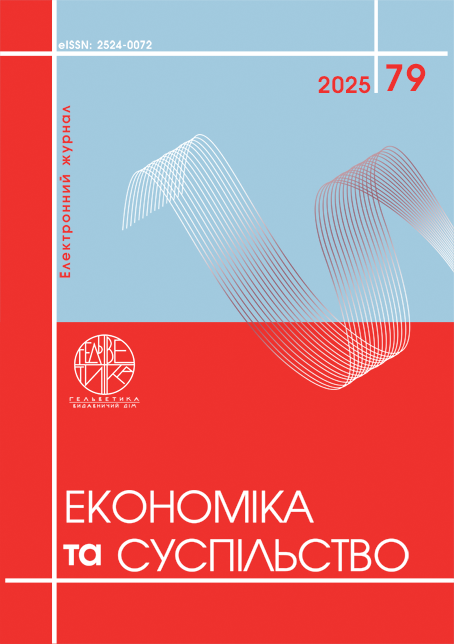ОЦІНКА ЕФЕКТИВНОСТІ МАРКЕТИНГОВИХ СТРАТЕГІЙ У ФОРМУВАННІ ПОТЕНЦІАЛУ РОЗВИТКУ ПІДПРИЄМСТВА
Анотація
У статті всебічно досліджено теоретико-методологічні та прикладні аспекти оцінювання ефективності маркетингово-збутових стратегій підприємств. Обґрунтовано роль маркетингу як ключового інструмента формування потенціалу розвитку підприємства, зміцнення його конкурентоспроможності, підвищення адаптивності до динамічних змін ринкового середовища та цифрової трансформації економіки. Детально розглянуто підходи до визначення ефективності маркетингової діяльності, систематизовано принципи добору показників оцінювання та визначено методичну послідовність проведення аналізу. Запропоновано інтегрований підхід, що поєднує кількісні розрахунки з емпіричними експертними оцінками, що дає змогу здійснити комплексну оцінку результативності реалізованих стратегій. Доведено, що ефективність маркетингу є стратегічним чинником підвищення прибутковості, оптимізації ресурсів, зміцнення бренду, розширення ринків збуту та забезпечення сталого розвитку підприємства.
Посилання
Балабанова Л. В. Управління маркетинговим потенціалом підприємства. Київ, 2006. 288 с
Гончаренко В. О. Інноваційні підходи до формування маркетингового потенціалу аграрних підприємств. Економіка АПК. 2022. № 23(1). С. 12–19.
Дайновський Ю. А., Семак Б. Б., Вовчанська, О. М. Стратегічне значення комунікацій як складової маркетингового потенціалу підприємства. Підприємництво і торгівля. 2018. № 22. С 69–74.
Дідченко О.І. Маркетинговий потенціал підприємства як складова економічного потенціалу. Теоретичні і практичні аспекти економіки та інтелектуальної власності. 2013. № 1. С. 269–272.
Крикавський Є. В., Похильченко О. А. Ефективність і результативність в управлінні ланцюгами поставок. Логістика проблеми і рішення. Міжнародний науково-практичний журнал. Харків, 2017. № 1. С. 16-21.
Петренко Т. М. Маркетингові стратегії в агробізнесі: навчальний посібник. Львів : ЛНУ, 2019. 180 с.
Поліщук І. І., Гудима Н. В. Маркетингове управління конкурентоспроможністю підприємства. Економіка та управління підприємствами. 2017. № 20. С. 514–517.
Сидоренко І. П. Оцінка маркетингового потенціалу аграрних підприємств: методологічні підходи. Вісник аграрної науки. 2021. № 3. С. 45–52.
Струпинська, Н. В. Методичний підхід до забезпечення ефективності маркетингової діяльності промислового підприємства. Бізнес Інформ. 2013. № 8. С. 379-387.
Шафалюк М. С. Розвиток маркетингового потенціалу спільнот споживачів. Маркетингова освіта в Україні : тези IV Міжнар. наук.-практ. конф., 29–30 берез. 2018 р., м. Київ, 2018. С. 110–112.
Balabanova, L. V. (2006). Upravlinnia marketynhovym potentsialom pidpryiemstva [Management of company’s marketing potential]. Kyiv: Profesional. 288 p. (in Ukrainian)
Honcharenko, V. O. (2022). Innovatsiini pidkhody do formuvannia marketynhovoho potentsialu ahrarnykh pidpryiemstv. Ekonomika APK, 23(1), 12–19. (in Ukrainian)
Daynovskyi Yu. A., Semak B. B., Vovchanska, O. M. (2018) Stratehichne znachennya komunikatsiy yak skladovoyi marketynhovoho potentsialu pidpryyemstva [The strategic importance of communications as a component of the marketing potential of an enterprise]. Pidpryyemnytstvo i torhivlya – Entrepreneurship and Trade, no. 22, pp. 69–74. (in Ukrainian)
Didchenko, O.I. (2013), «Marketyngovyj potencial pidpryjemstva jak skladova ekonomichnogo potencialu», Teoretychni i praktychni aspekty ekonomiky ta intelektual'noi' vlasnosti, No. 1, pр. 269–272. (in Ukrainian)
Krykavskyi, Ye. V., Pokhylchenko, O. A. (2017). Efektyvnist i rezultatyvnist v upravlinni lantsiuhamy postavok [Effectiveness and efficiency in the supply chains management]. Logistics problems and solutions. International scientific and practical journal, 1, 16-21. (in Ukrainian)
Petrenko, T. M. (2019). Marketynhovi stratehii v ahrobiznesi: navchalnyi posibnyk. Lviv: LNU. 180 р. (in Ukrainian)
Polishhuk I. I., Ghudyma N. V. (2017) Marketynghove upravlinnja konkurentospromozhnistju pidpryjemstva [Marketing management of enterprise competitiveness]. Ekonomika ta upravlinnja pidpryjemstvamy – Economics and Business Management, no. 20, pp. 514–517. (in Ukrainian)
Sydorenko, I. P. (2021). Otsinka marketynhovoho potentsialu ahrarnykh pidpryiemstv: metodolohichni pidkhody. Visnyk ahrarnoi nauky, (3), 45–52. (in Ukrainian)
Strupynska, N. V. (2013). Metodychnyi pidkhid do zabezpechennia efektyvnosti marketynhovoi diialnosti promyslovoho pidpryiemstva [Methodical approach to ensuring of marketing activities effectiveness of an industrial enterprise]. Business Inform, 8, 379-387.
Shafalyuk M. S. (2018) Rozvytok marketynhovoho potentsialu spilʹnot spozhyvachiv [Development of the marketing potential of consumer communities]. Marketynhova osvita v Ukrayini – IV Mizhnar. nauk.-prakt. konf. (March 29–30, 2018, Kyiv). Kyiv, 2018. P. 110–112. (in Ukrainian)
Авторське право (c) 2025 Володимир Вовк, Олексій Черкаський

Ця робота ліцензується відповідно до Creative Commons Attribution 4.0 International License.


